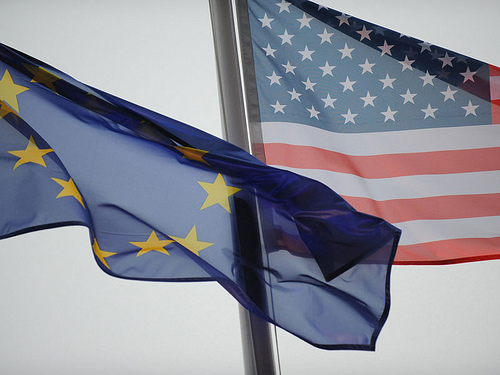
France’s finance ministry reels from a massive cyber attack, NATO shows no intention of intervening in Libya, and the captured British MI6 and SAS officers were released by Libyan rebel commanders.
HEADLINES:
Russia and Georgia are talking again but U.S. not involved (Foreign Policy)
Three years after the war between Russian and Georgia, the two countries have started a process to discuss Russia’s bid to join the World Trade Organization, top White House officials said. However, the U.S. government is not involved in those discussions.
EU diplomat in Tripoli: situation looks ‘almost calm’ (EUobserver)
An EU fact-finding mission has landed in Tripoli and met with Libyan and EU diplomats to discuss the safety of European citizens still in the war-torn country.
Agostino Miozzo, EU foreign relations chief Catherine Ashton’s right-hand-man on crisis management, told EUobserver by phone from the Italian embassy in Tripoli on Monday morning (7 March): "The situation is relatively calm, quiet. There was no shooting during the night. Traffic is almost calm and there are people around. The only sign of crisis is at the airport, where there are 2,000 or 3,000 Africans waiting to go back to their countries."
Estonia’s government wins first vote as eurozone member (The Globe and Mail)
Estonia’s center-right government was poised to stay in power for a second term after winning a clear parliamentary majority Sunday in the Baltic country’s first election as a eurozone member, preliminary results showed.
NATO Says ‘No Intention’ of Intervening in Libyan Uprising (Voice of America)
A top NATO official says the alliance has "no intention" for the time being of intervening in Libya’s anti-government uprising.
But in a news conference Monday at NATO headquarters in Brussels, Secretary-General Anders Fogh Rasmussen said the alliance is also conducting "prudent planning for any eventuality."
SAS and MI6 officers released by Libya’s rebel commanders (The Guardian)
The group’s capture is a major embarrassment to the British government and could potentially undermine the rebels’ claims that the revolution has had solely domestic roots
Cyber attack on ministry ‘targeted G20 information’ (France24)
France’s finance ministry was the target of one of the largest ever cyber-attack on a French government office, the government has confirmed. According to experts, the hackers were after documents relating to the G20.
Prime minister to take over finance ministry (B92)
BELGRADE — The Serbian cabinet will comprise 21 members and 17 ministries after a reshuffle, Prime Minister Mirko Cvetković announced late on Sunday.
‘A Lesson from the Right-Wing Populists’ Book’ (Der Spiegel)
Germany’s new interior minister touched off controversy within hours of taking office when he said that Islam did not historically "belong" to Germany, causing Muslim groups to react furiously. On Monday, editorialists wonder whether the comments were inspired by upcoming elections.
EDITORIALS AND COLUMNS:
Time to choose (Presseurop)
Much ink has already been spilled over Europe’s awkward response to the Arab revolutions: we have been told that its support for dictators has led it to disregard popular demands for freedom, that its approach is solely concerned with immigration and terrorism, that it is intent on closing the door on North Africa when it should be offering help, and that it is incapable of defining and clearly expressing a common position… In short, Europe has been roundly criticised for missing out on a historic opportunity to react positively to events that are of worldwide importance.
Compiled with the assistance of Klee Aiken.
Image: transatlantic.jpg
